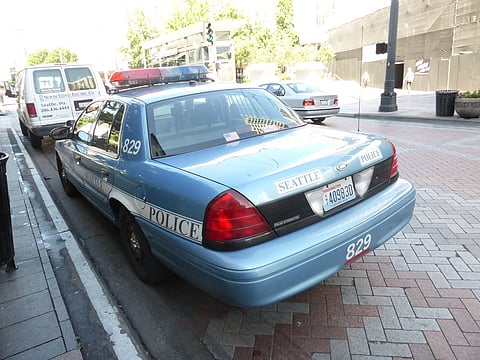Community Police Commission Appoints Permanent Director
by Paul Kiefer
(This article originally appeared in Publicola and has been reprinted under an agreement).
Seattle's Community Police Commission (CPC) promoted its interim executive director, Brandy Grant, to a permanent position during a commission meeting on Wednesday morning.
(Photo courtesy of the Community Police Commission).
Grant, who took over as interim executive director in August 2020, was one of three candidates seeking the position. The others were Eddie Aubrey, the manager of the Office of Professional Accountability in the Richmond, California police department; and Ed Harness, the executive director of Albuquerque's Civilian Police Oversight Agency.
Aubrey began his career as a police officer in Los Angeles and Santa Monica, but he stepped away from policing after the beating of Rodney King by a group of Los Angeles Police Department coworkers in 1992. He later worked as a deputy prosecutor for King County and as Renton's chief prosecutor, and he established the Office of Independent Review for the Fresno Police Department. As Aubrey told the CPC in a public interview on Monday night, the City of Fresno closed his office "due to lack of funding" after he refused to re-write an critical audit of a fatal police shooting that also sparked a federal civil rights case against the city.
Harness took charge of Albuquerque's Civilian Police Oversight Agency in 2015; before that, he was a police officer in Milwaukee, a private attorney and a volunteer police commissioner in Wisconsin. In his interview on Monday, Harness cast himself as a "credible" and "pragmatic" choice for the CPC's executive directorship, arguing that SPD would be more open to his input because of his law enforcement background.
He also suggested a policy priority for the CPC: increasing the minimum hiring age for police officers to 25 and eliminating "veterans preference points" in the department's hiring process. (The Washington State Senate is considering a bill, sponsored by Senator Patty Kuderer, that would effectively do the former).
Grant was the only candidate without a background as a police officer; before her appointment as a CPC commissioner in 2019, Grant worked as a therapist and public health nonprofit manager. Grant was also the only candidate to express support for "dismantling" and re-structuring Seattle's police disciplinary process, though she didn't offer detailed plans to the CPC.
She added that her primary concern is increasing public awareness of the CPC's role in the city's police accountability structure. "We would have more support from community if people clearly understood who we are and what we do," she told the commissioners on Monday. Grant shares that concern with past CPC executive directors — after the Seattle city council made the CPC a permanent agency in 2017, then-executive director F Lopez also said that raising the commission's profile and earning community trust were her top priorities.
The CPC director manages the CPC's $1.5 million budget and five staff members, and serves as a spokesperson for the commission one in presentations to other branches of city government. However, the CPC's role in the city's police accountability structure is only advisory: the commission can make recommendations about SPD policy changes, including the 15 policy recommendations the CPC released on Monday. As of last fall, it also has a role in shaping the city's agenda and strategy for contract negotiations with police unions.
On Wednesday, the CPC voted nearly unanimously — eleven in favor, with two abstentions — for Grant's appointment. She is the second executive director to be chosen from the CPC itself; the commission promoted her predecessor, Bessie Marie Scott, from policy director to interim executive director in 2019. Grant will also be the commission's first permanent director in a year and a half.
Paul Faruq Kiefer is a journalist, historian, and born-and-bred Seattleite. He has published work withKUOW,North Carolina Public Radio, andThe Progressivemagazine, and he is currently working on a podcast forKUAFin Fayetteville, Arkansas. Paul reports on police accountability for PubliCola.
Featured image: photo from British Columbia Emergency Photography under a Creative Commons 2.0 license.
Before you move on to the next story …
The South Seattle Emerald™ is brought to you by Rainmakers. Rainmakers give recurring gifts at any amount. With around 1,000 Rainmakers, the Emerald™ is truly community-driven local media. Help us keep BIPOC-led media free and accessible.
If just half of our readers signed up to give $6 a month, we wouldn't have to fundraise for the rest of the year. Small amounts make a difference.
We cannot do this work without you. Become a Rainmaker today!
Help keep BIPOC-led, community-powered journalism free — become a Rainmaker today.


